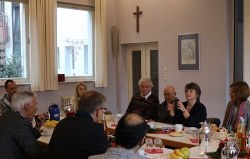
Contact: World Council of Churches, +41 79 507 6363; www.oikoumene.org/press
GENEVA, Dec. 20, 2016 /Standard Newswire/ -- Baden-Württemberg minister-president, Winfried Kretschmann, has expressed gratitude to the churches for putting Christian service and neighbourly love into practice, and not only at Sunday sermons.
Photo: Bishop Cornelius-Bundschuh and the WCC general secretary meet with parish members in Ettlingen. © Annegret Kapp/WCC
The German state's governor Kretschmann gave his message in a meeting with the general secretary of the World Council of Churches, Rev. Dr Olav Fykse Tveit, in Stuttgart last Thursday.
Kretschmann said the "readiness to help that swept through the country like a wave" since last year in a region with strong civic engagement, was "the most impressive experience of my presidency."
Tveit's host Bishop Dr Jochen Cornelius-Bundschuh of the Evangelical Church in Baden affirmed that the refugee work is supported from the grassroots of the church and throughout all levels of leadership.
At a refugees' reception centre in Heidelberg’s former military barracks at Patrick Henry Village, Tveit saw a collaborative system working to ensure humanitarian standards and minimized tensions.
The centre now houses up to 2,000 people at any one time, many of whom are traumatized and coming from a broad range of backgrounds. Different authorities collaborate to accelerate decisions on who is granted asylum. The aim is for those allowed to stay in Germany to move into decentralized, longer-term accommodation after two weeks.
Pressure on officers
Quick integration of refugees is a good idea, say church representatives in the reception centre providing independent counselling for refugees. However, the pressure on officers to decide quickly restricts fair consideration for individual life stories, and leaves little time for the independent counsellors to reach the refugees and build up trust.
In Germany, cooperation between the State and the churches has a long tradition, with diaconal agencies providing government-financed social services. Refugees, even those who belong to different faiths, appreciate independent counselling by Protestant and Roman Catholic agencies. However, when counsellors help refugees claim their right to protection, they can be viewed sometimes as an irritant, as well as a support by State officials.
In the reception centre, besides counselling, the churches coordinate volunteers' work such as language classes, and offer pastoral care to refugees and staff at the centre. "It's wonderful that we're now an ecumenical and even an interfaith pastoral care team," says Rev. Sigrid Zweygart-Pérez.
Caring for the children who usually accompany their parents everywhere at the centre, whether for medical check-ups or to seek counsel for traumatic experiences, is important for both professionals and volunteers.
Diaconal street workers connect with shuttle busses to the city to facilitate orientation and stem insecurity feelings in the local population.
Martin Heß, managing director of Heidelberg's Protestant diaconal agency, told Tveit: "As church, we are proud of the work we do and glad that you take an interest in it."
And Tveit responded: "As a worldwide church fellowship we are also proud of the work you do."
Accompaniment at the local level
The following day at a local parish, the Evangelical Church in Baden further showed how it accompanies and integrates refugees.
At the drop-in and encounter centre "K26" in Ettlingen, secular authorities, churches and other civil society initiatives work hand in hand.
The centre brings together locals and refugees as well as other potentially marginalized groups, such as people with disabilities, or the elderly.
The largest initiative, with some 100 active members and a wider network of 400, started at a Protestant parish welcome evening. Long hosted in the Catholic parish centre, it involves both Christians and non-Christians.
Henrike Ochs, from a Protestant parish, looks after the K26 professionally on behalf of the secular authorities now. As a trained nurse, she first voluntarily accompanied refugees through the pastor, looking after a sick child.
Now Ochs aims to enable refugees to become active community members, as did a former school director from Syria who runs an eight-week introductory course in Arabic language and culture for 40 participants.
The Protestant parish prides itself for renting to local authorities the living space for several refugee families in a centrally located house, much below market rates.
"The flats are small," explained pastor Andreas Heitmann-Kühlewein, "but the location right next to the kindergarten, and being looked after by the congregation make this a very good place for refugees."
Skeptical about refugees
Initially, the neighbours appeared skeptical about having a refugees' home in their street.
"A party that we organized in the kindergarten courtyard with many of our volunteers, and invitations going out to all the neighbours, helped to change the mood," recalled the pastor.
Meeting Ettlingen parish members, Tveit and Cornelius-Bundschuh heard that the congregation feels enriched by the refugees.
Retired pastor Gernot Spelsberg, a volunteer offering baptism classes for those interested in a conversion to Christianity, too, feels he gains spiritually through the courses.
The congregation includes some 30 Iranian-born recent converts. Two of them have leadership roles as members of the parish council of elders and the Evangelical Church in Baden's synod.
The WCC Central Committee's Rev. Anne Heitmann, who also belongs to the Ettlingen parish, and noted, "Each such baptism deeply impresses the congregation and encourages also our confirmation class students and their parents to discover anew the treasure of faith."
The church district's refugee project leader, Andrea Baisch-Herrmann, said that "thanks to the refugees many hidden issues of social needs in the neighbourhoods have surfaced and thanks to them, our work for society has become more visible again."
General secretary Tveit said there is much to be done, but there are many people doing what they can, aware that their cooperation helps everyone.
High-resolution photos for download free of charge
WCC member churches in Germany
WCC work on Migration and social justice
Press release of the Evangelical Church in Baden about Tveit's visit




 Sign Up to Receive Press Releases:
Sign Up to Receive Press Releases: